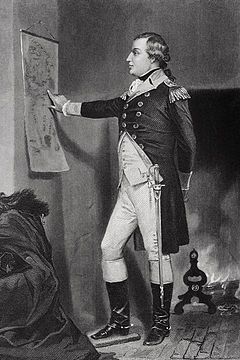Of all the former British officers who fought on the patriot side in the American Revolution, the most militarily talented was Richard Montgomery. Born near Swords in County Dublin in 1738, he was a member of an Ulster Scots family notable for supplying officers to the British Army. After studying at Trinity College he joined the 17th Foot in 1756, his father purchasing an ensign’s commission for him. During the siege of Louisburg in 1758 his courage and initiative earned him promotion to Lieutenant. In 1759 he participated in the siege of Fort Carillon and in 1760 was made adjutant of the regiment, a singular honor for an officer so young. During subsequent fighting in the West Indies he was promoted to Captain. After participating in the suppression of Pontiac’s Rebellion, Montgomery returned to Britain to recover his health, exhausted and ill from years of campaigning.
In Britain he became friends with Whig members of the British Parliament, including Edmund Burke and began to question British policies in America. He sold his commission in 1772 for 1500 pounds, intent on retiring to America and becoming a gentleman farmer.
In America he married Janet Livingston, sister of future Founding Father Robert Livingston in 1773. It was a love match marred by a dream in which Janet saw Montgomery being killed in a duel with his brother. Montgomery responded stoically, I have always told you that my happiness is not lasting…Let us enjoy it as long as we may and leave the rest to God.
Associated with a strong New York patriot family, additionally politically powerful, Montgomery gradually became a firm patriot, convince that the British government was acting tyrannically against the Americans. On June 22, 1775 he was appointed a Brigadier General in the newly formed Continental Army and made deputy to Major General Philip Schuyler who commander the Continental forces in the north, charged with the invasion of, or, as the Americans saw it, the liberation of Canada. Schuyler’s health failing him, Montgomery took command of the invasion force.
On October 19, Montgomery took Fort Chambly on the Richelieu River, the vital transportation link between Lake Champlain and the Saint Lawrence River which led to Montreal and the grand prize of Quebec. The success at Chambly was followed by the fall of Fort Saint John the key fortification on the Richelieu River on November 3, the crowning success after frustrating failures to take the fort by the Americans in September and October.
On November 13, after a difficult march in wintry weather, Montreal fell without a shot, Governor Guy Carleton sailing to Quebec. Montgomery now had a clear path to sailing to Quebec and linking up with Arnolds force that had reached Quebec after an epic march through the Maine wilderness. The fall of Canada to the Americans seemed about to occur.


Somehow, as an industrious genealogy-minded niece of mine said, I’m related to the first “governor” of Montreal.
Having been there lately with their empty churches, and their public goat-head Satanic worshipping on the main streets, I tend to mostly stay quiet about it.
Quebec was one of the most Catholic places on Earth less than 60 years ago….but no more. The Liberal Party destroyed it.
I began reading a book by Kevin Phillips, 1775. The author points out that the year 1775 was as critical as any other year, and more than most, to the birth of the USA. The author noted the tension and often outright hatred between then Puritan New England and their fellow British subjects, the then Catholics of Quebec. They border each other.
I have noted before that the rabid anti-Catholicism of New England precluded Quebec from joining the American War for Independence.
It will be left to the remnant, small as it is, in Quebec to rebuild the Church there. First, they must realize that salvation is not found in politics.